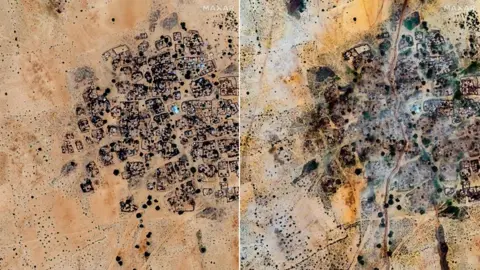The iconic Acropolis in Athens has shut its gates for the second time this season as Greece grapples with a fierce heatwave, prompting safety measures for the influx of tourists. The closure announced by the country's culture ministry will take place from 13:00 to 17:00 local time (11:00-15:00 BST) due to alarming forecast temperatures reaching up to 42°C (107°F) in parts of the country.
The persistent heat has brought a Category 4 wildfire warning, indicating a high risk for fires, echoing similar conditions that have devastated other parts of Europe, including France and Catalonia in Spain. Just weeks after an initial summer heatwave, Greece is experiencing a resurgence of extreme temperatures, which led to previous closures of the beloved monument in June and July of the same year.
Authorities emphasize that these measures prioritize the safety of staff and the tens of thousands of daily visitors—an estimated 4.5 million expected in 2024. In conjunction with the Acropolis closure, Greece’s labor ministry has mandated a five-hour cessation of work for outdoor laborers during the peak heat hours on Tuesday.
As heatwave conditions are anticipated to extend into Wednesday with temperatures likely hitting 40-42°C in southern regions, the country is wrestling with wildfire outbreaks. Reports indicate 41 new wildfires ignited in Greece on Monday, with 34 swiftly contained while seven remain an active threat. Emergency services remain vigilant, imploring the public to exercise caution.
Elsewhere, over a thousand firefighters battled a major wildfire in southwestern France, forcing evacuations in Narbonne and the closure of a major connecting motorway to Spain. Meanwhile in Catalonia, more than 2,000 residents have been locked down as wildfire struggles continue in Tarragona.
With increasing temperatures and frequent heatwaves a direct consequence of climate change, the UN has projected heightened frequency and intensity will persist in the future, reinforcing the urgency for proactive measures against such environmental shifts.
The persistent heat has brought a Category 4 wildfire warning, indicating a high risk for fires, echoing similar conditions that have devastated other parts of Europe, including France and Catalonia in Spain. Just weeks after an initial summer heatwave, Greece is experiencing a resurgence of extreme temperatures, which led to previous closures of the beloved monument in June and July of the same year.
Authorities emphasize that these measures prioritize the safety of staff and the tens of thousands of daily visitors—an estimated 4.5 million expected in 2024. In conjunction with the Acropolis closure, Greece’s labor ministry has mandated a five-hour cessation of work for outdoor laborers during the peak heat hours on Tuesday.
As heatwave conditions are anticipated to extend into Wednesday with temperatures likely hitting 40-42°C in southern regions, the country is wrestling with wildfire outbreaks. Reports indicate 41 new wildfires ignited in Greece on Monday, with 34 swiftly contained while seven remain an active threat. Emergency services remain vigilant, imploring the public to exercise caution.
Elsewhere, over a thousand firefighters battled a major wildfire in southwestern France, forcing evacuations in Narbonne and the closure of a major connecting motorway to Spain. Meanwhile in Catalonia, more than 2,000 residents have been locked down as wildfire struggles continue in Tarragona.
With increasing temperatures and frequent heatwaves a direct consequence of climate change, the UN has projected heightened frequency and intensity will persist in the future, reinforcing the urgency for proactive measures against such environmental shifts.





















